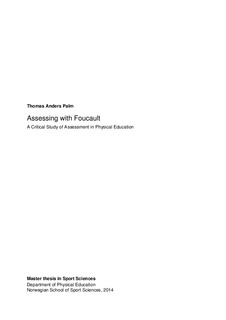| dc.description.abstract | Assessment in physical education [PE] is an area with fraught validity, little consensus and a slow ability to change (Arnesen, Nilsen & Leirhaug, 2013). Productive and innovate assessment practices such as formative assessment remain proposed and suggested in literature as a way of coping with these issues, but these suggestions are barely implemented in reality (Lopez-Pastor et. al., 2013). The purpose of this study aims therefore to discuss and interpret student assessment in physical education as a way of understanding this unstable development. The study’s research questions asked about student’s perception and reflection regarding assessment in PE, and how Foucaultian theory could contribute in a discussion of that. The research is critical in nature and aims to discuss both problematic and productive sides of assessment practices. The empirical material is qualitative and consists of observations of two PE classes during several lessons, as well as interviews with eleven students from these classes. The study was conducted in an upper secondary school in southern Norway. Interviews and observation notes were transcribed and used for analyses. The analytical process made codes, organized and categorized the data while increasingly implementing theory. Contemporary assessment literature and Foucault’s theories surrounding power, disciplining technologies, discourse, the examination and panopticism (Foucault, 1977) were used as analytical framework in order to illustrate and facilitate an understanding of issues and potentials concerning physical education assessment. As a result of the study four central themes emerged as particularly interesting. These were ‘holistic and fragmented assessment’, ‘teacher power through assessment’, ‘assessment and learning in physical education’ and ‘feedback and student initiative’. Discussions of these argued that students perceive and reflect upon assessment as something holistic, where they struggle to grasp its contents. This led the research to investigate what a holistic and shaded assessment practice; assessment practice that is not open to negotiation, can lead to. Investigations concluded that a central issue with assessment in physical education is that it can (re)produce a problematic panopticizing effect (Foucault, 1977). This effect makes students normalize and hierarchize each other constantly as an unquestioned disciplinary mechanism (Foucault, 1977). Teachers were
4
found to emphasize this effect and repress a potential for learning in the subject.
Teachers were thus held accountable for some of the issues with assessment in PE,
notwithstanding that the repression of learning in the subject was also found to be
related to discourse and surveillance; physical education is centred on an ‘activity
discourse’ rather than a ‘learning discourse’. Ottesen (2011) supports that discourses
and actors surrounding the subject seem to shape a framework that prohibits physical
education to be thought of as a ‘learning subject’. Feedback and student inclusion were,
as expected (Black & Wiliam, 1998; Eide, 2011), found to be relatively rare in this
study, although they were uplifted as highly potent techniques which increase learning,
motivation, assessment visibility and productive docility.
To such an extent, the study does facilitate an understanding of physical education
assessment’s resistance to change. Foucault has helped illuminate powerful discursive
structures which, if not challenged, will remain as epistemological obstacles against
development in the field. This research also identified certain practices that are more
dangerous than others, and suggested counteraction in order to progress assessment
towards facilitation of learning. | nb_NO |
